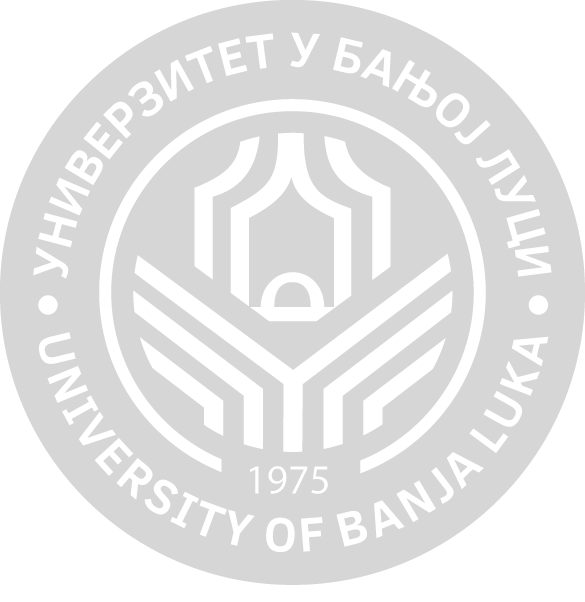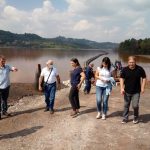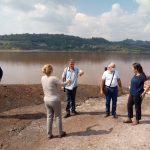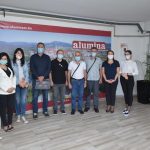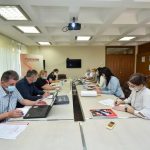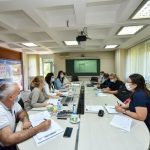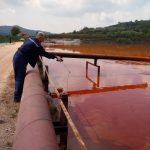

Partneri na projektu RIS RESTORE finansiranom od strane fonda EIT RawMaterials sastali su se 10.09. u Zvorniku u upravi kompanije „Alumina“. Sastanku su prisustvovali predstavnici četiri tima iz Bosne i Hercegovine: Federalni zavod za geologiju, Rudarsko-geološko-građevinski fakultet Univerziteta u Tuzli, Prirodno-matematički fakultet Univerziteta u Banjoj Luci, a sastankom je predsjedavala direktorka Sektora integrisane zaštite „Alumine“ dipl.inž. Dragana Smiljanić. Učešće „Alumine“ u ovom projektu je od izuzetne važnosti obzirom da je „Alumina“ jedan od vodećih proizvođača raznih vrsta glinica, hidrata, zeolita, silika gela i vodenog stakla koji nalaze primjenu u raznim industrijima. Kompanija trenutno izvozi preko 95% svojih proizvoda u više od 40 zemalja EU, Azije, Afrike, SAD, Južne i Centralne Amerike i ostale. „Alumina“ je jedina fabrika na zapadnom Balkanu koja se bavi preradom boksita po Bayer-ovom postupku i proizvodnjom različitih vrsta hidrata i glinica.
Kompanija trenutno zapošljava oko 1.520 radnika, ima više od 800 dobavljača i poslovnih partnera iz Republike Srpske i Federacije BiH, Srbije i zemalja bivše Jugoslavije. Na poslovanje fabrike naslonjeno je više hiljada radnika, prije svega u Zvorniku i regiji Birač.
„Alumina“ u procesu prerade boksitne rude, koja dolazi iz više nalazišta u Bosni i Hercegovini, generiše otpadni materijal koji se naziva „crveni mulj“. Međutim, crveni mulj i dalje nosi veliki potencijal kao sekundarna sirovina. Esktrakcija korisnih minerala iz ovakvih sekundarnih sirovina je posljednjih godina jedna od vodećih istraživačkih grana, a takođe i mnogih uspješnih ulaganja u privredi. Tako npr. Vijetnam prerađuje skoro sav crveni mulj iz ove zemlje u korisne proizvode, a i Kina takođe postiže stepen reciklaže od oko 5% i napreduje i dalje. Procjenjuje se da se u Evropi na više odlagališta nalazi oko 80 miliona tona crvenog mulja. Koordinator projekta je slovenački Zavod za gradbeništvo, a partneri su, osim navedenih iz BiH, takođe i prestižni univerziteti i instituti iz Grčke, Španije, Mađarske, Švajcarske, Hrvatske i Austrije. Partneri će u toku projekta uložiti napore da definišu potencijale za preradu crvenog mulja u korisne proizvode, čime bi bio učinjen značajan korak na smanjenju količine ovog, za sada deponovanog otpada. Za našu zemlju je od velikog značaja što bi valorizacija crvenog mulja dovela do otvaranja još radnih mjesta u već vrhunski uspješnoj kompaniji kakva je „Alumina“, koja je u ovom trenutku nesumnjivo najuspješnija kompanija u Bosni i Hercegovini.
Poveznica:
RIS RESTORE project: start of the field and research activities
Partners on the RIS RESTORE project funded by the EIT RawMaterials met on September 10 in Zvornik in the management of the company „Alumina“. The meeting was attended by representatives of four teams from Bosnia and Herzegovina: Federal Institute of Geology, Faculty of Mining, Geology and Civil Engineering, University of Tuzla, Faculty of Natural Sciences and Mathematics, University of Banja Luka, and the meeting was chaired by the Director of Integrated Protection B.Eng. Dragana Smiljanic. The participation of „Alumina“ in this project is extremely important since „Alumina“ is one of the leading manufacturers of various types of alumina, hydrates, zeolites, silica gel and water glass that are used in various industries. The company currently exports over 95% of its products to more than 40 countries in the EU, Asia, Africa, USA, South and Central America and others. Alumina is the only factory in the Western Balkans that processes bauxite according to the Bayer process and produces various types of hydrates and alumina.
The company currently employs about 1.520 workers, has more than 800 suppliers and business partners from Republika Srpska and the Federation of Bosnia and Herzegovina, Serbia and the countries of the former Yugoslavia. Thousands of workers rely on the factory’s operations, primarily in Zvornik and the Birač region.
During the processing of bauxite ore, which comes from several deposits in Bosnia and Herzegovina, „Alumina“ generates waste material called „red mud“. However, red mud still carries great potential as a secondary raw material. Extraction of useful minerals from such secondary raw materials has been one of the leading research branches in recent years, as well as many successful investments in the economy. For example, Vietnam processes almost all of the red mud from this country into useful products, and China is also achieving a recycling rate of about 5% and is making further progress. It is estimated that there are about 80 million tons of red mud in several landfills in Europe. The coordinator of the project is the Slovenian National Building and Civil Engineering Institute, and the partners are, in addition to those mentioned from B&H, also prestigious universities and institutes from Greece, Spain, Hungary, Switzerland, Croatia and Austria. During the project, the partners will make efforts to define the potentials for processing red mud into useful products, which would be a significant step towards reducing the amount of this waste, so far deposited. It is of great importance for our country that the valorization of red mud would lead to the creation of more workplaces in an already highly successful company such as „Alumina“, which is undoubtedly the most successful company in Bosnia and Herzegovina at the moment.
Link:
